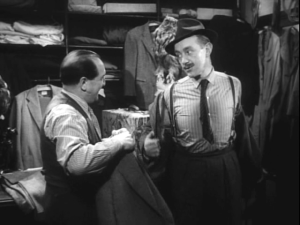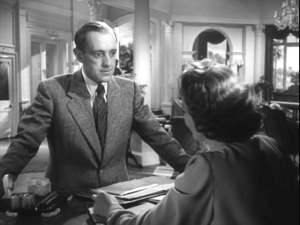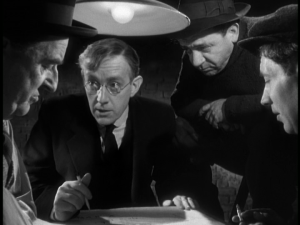 Alec Guinness Centennial Series at the UW Cinematheque
Alec Guinness Centennial Series at the UW Cinematheque
Opening night comedy double feature reviewed by Jake Smith and James Kreul
After the opening night premiere of Kelly Reichardt’s Night Moves (reviewed here), the UW Cinematheque begins its Alec Guinness Centennial series on Saturday, September 6 with a double feature of two classic comedies, following up on the summer screening of Kind Hearts and Coronets. The series as a whole does a great job mixing more and less familiar titles from Guinness’s distinguished career. You can prepare yourself for the series by exploring Guinness films available on DVD and streaming posted on Madison Film Forum last week. Below, Jake Smith re-visits at a well known classic The Lavender Hill Mob (1951); and James Kreul looks at the lesser known but just as distinguished Last Holiday (1950)
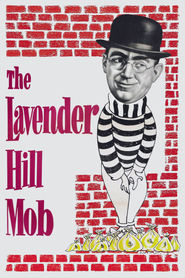 The Lavender Hill Mob (Charles Crichton, UK, 1951, 81 min.)
The Lavender Hill Mob (Charles Crichton, UK, 1951, 81 min.)
UW Cinematheque, 4070 Vilas Hall, Saturday, September 6, 7pm»
Great heist films, like most great films in general, occur at the intersection of planning and improvisation. To pull off a great heist film takes some doing, but to pull off a great heist comedy? It might actually be easier to rob a bank. The Ealing Studios classic The Lavender Hill Mob makes it look deceptively effortless.
UW Cinematheque’s star of the semester, Sir Alec Guinness, plays the shrewdly sheepish Holland, a bank clerk who keeps watch over gold bullion transports. Wanting more out of life than his meek station and salary, like any good heist protagonist, he puts his mind and his will to work on taking the bank for all it’s worth, enlisting a hilarious gang of accomplices (particularly the endearing Stanley Holloway as Pendlebury) in aid of his scheme.
While the film observes the traditional plan-execute-getaway structure of the heist film, director Charles Crichton shows that the comedy’s always in the complications. The Lavender Hill Mob begins with dashes of understated wit and light class commentary. As the getaway plans begin to unravel for our “mob,” the comedy shifts to more the absurdly situational and physical. It is, from first frame to last, a thoroughly British comedy. Just about the only thing in the film that doesn’t work is a montage of Scotland Yard on the case that sports a “crime does not pay” voiceover. Every other scene is as golden as the bullion the gang is out to steal.
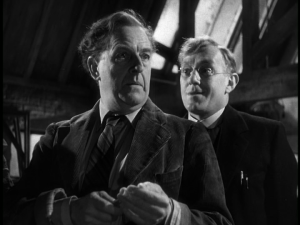 Because the spotlight is on Guinness, I’d be remiss in not saying more about his performance. Most people of my generation knew him first and foremost as Obi-Wan Kenobi, and in that, as in other roles, he exuded an almost ineffable gravitas. To focus solely on his dramatic talents would be truly criminal, for The Lavender Hill Mob (among many others) showcases his comedic gifts. Notice the grin whenever he asks for the guard’s gun, or the way his hushed voice sounds, as though he is letting you in on a secret joke, to say nothing of his antics when he and Stanley Holloway are together in the Paris sequence. Only Guinness could play such a meticulous ringleader who then airily tells his compatriots to “spare him the details.” In short, few men could be as elegantly silly as he.
Because the spotlight is on Guinness, I’d be remiss in not saying more about his performance. Most people of my generation knew him first and foremost as Obi-Wan Kenobi, and in that, as in other roles, he exuded an almost ineffable gravitas. To focus solely on his dramatic talents would be truly criminal, for The Lavender Hill Mob (among many others) showcases his comedic gifts. Notice the grin whenever he asks for the guard’s gun, or the way his hushed voice sounds, as though he is letting you in on a secret joke, to say nothing of his antics when he and Stanley Holloway are together in the Paris sequence. Only Guinness could play such a meticulous ringleader who then airily tells his compatriots to “spare him the details.” In short, few men could be as elegantly silly as he.
Don’t just take my word for it, though. See for yourself this Saturday, and start this semester’s Alec Guinness retrospective with some comedy gold!
—Jake Smith
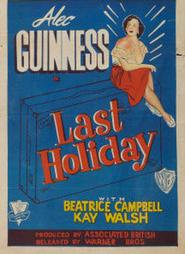 Last Holiday (Henry Cass, UK, 1950, 88 min.)
Last Holiday (Henry Cass, UK, 1950, 88 min.)
UW Cinematheque, 4070 Vilas Hall, Saturday, September 6, 8:30pm»
Alec Guinness was always a bit of a chameleon across the course of his career, not only between films (think of the differences in his roles in the David Lean films alone) but also within films (most famously playing eight roles in Kind Hearts and Coronets). Last Holiday utilizes this quality a bit differently as Guinness plays George Bird, a working man who receives a terminal diagnosis and decides to cash in all of his savings to spend his last days at an upscale resort. But he is first persuaded by a pawn shop owner to purchase some suits and suitcases from the estate of a deceased Lord. When Bird arrives at the resort, he provokes a flurry of speculation from the upper class guests about his background and status. Bird doesn’t want to be a chameleon, but his outward appearance completely alters the way that he is regarded and respected by the resort staff and guests.
Last Holiday is a sheer delight as it effortlessly shifts between social satire, romance, melodrama, and some genuinely black humor. As we know from more recent examples like Downton Abbey, the British have a unique take on their concepts of class and status. Director Henry Cass not only weaves together different classes in the guest and staff hierarchy, but also different accents that make the film as much fun to listen to as to watch. Like Peter Sellers’s Chance in Being There, George Bird discovers that many opportunities open up for him simply because people think that he is somebody. While he refuses to discuss his diagnosis, he is blunt and honest about every other topic, making him different than anyone the resort guests have meet socially. And his refusal to pursue these opportunities, because he believes he only has weeks or months left, leads him to even more opportunities. And comedy ensues.
A few thoughts in case you’re on the fence about going on Saturday night. First, both films will re-introduce you of the joys of tight, efficient, classic 90-minute comedies after a summer of bloated blockbusters. Last Holiday is particularly dazzling in its narrative efficiency and swift pace despite touching on many social issues. Second, as great as Guinness is in the film, the whole cast, consisting of some great character actors and actresses, give the film a vibrant comic energy. Anything with Wilfrid Hyde-White is worth watching, regardless of the size of his role. And you’ll spend a good amount of time asking yourself where you know Inspector Wilton from (spoiler: it’s a young Bernard Lee, “M” in the James Bond films). And finally, the strongest reason to recommend the film is that it fully commits to its comic premise, and does not compromise on that premise the way that a Hollywood film of the same era would have (and let’s not even think about the similarly titled Queen Latifah film from 2006). This leads to some genuinely dark observations about human nature and the way that we tend to regard others around us.
As always, we include links below if you can’t make it to the screening and want to catch up with the films at home. But this double feature should play particularly well with a crowd, and both features will be projected in 35mm, so try your best to make it to the UW Cinematheque if you can.
—James Kreul
